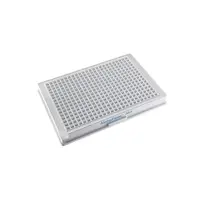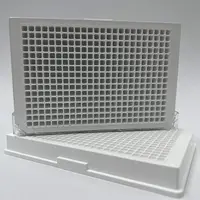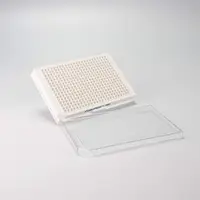
AlphaLISA Human PAI-1 Detection Kit, 500 Assay Points

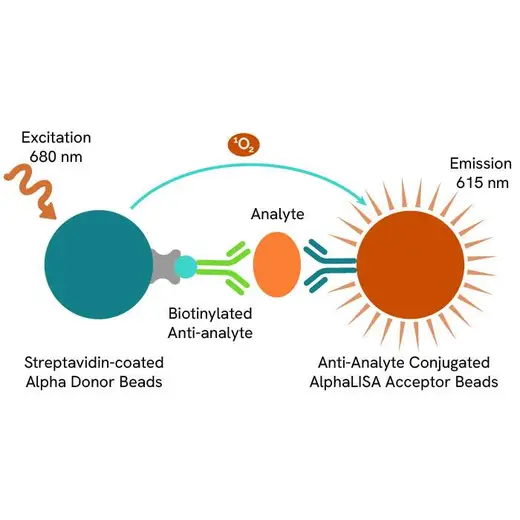
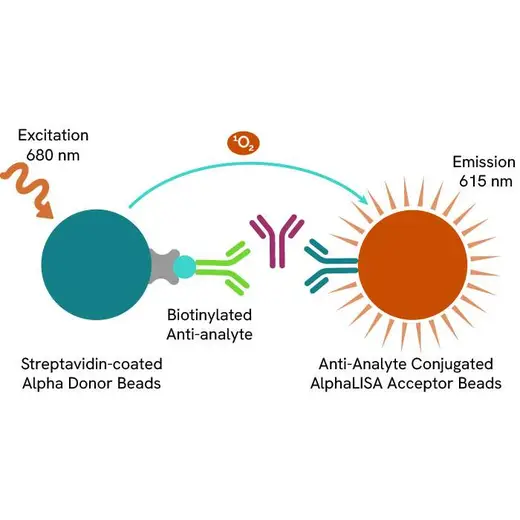











The AlphaLISA® Human Plasminogen Activator Inhibitor-1 (PAI-1) Detection Kit is designed for detection and quantitation of human PAI-1 in serum, buffered solution or cell culture medium in a homogeneous (no-wash steps, no separation steps) assay. The analyte in this kit consists of the active glycosylated human PAI-1.
For research use only. Not for use in diagnostic procedures. All products to be used in accordance with applicable laws and regulations including without limitation, consumption & disposal requirements under European REACH regulations (EC 1907/2006).
Product information
Overview
Formats:
- Our 500 assay point kit allows you to run 500 wells in 96-well or 384-well format, using a 50 µL reaction volume (5 µL of sample).
- Our 5,000 assay point kit allows you to run 5,000 wells in 96-well or 384-well format, using a 50 µL reaction volume (5 µL of sample).
Features:
- No-wash steps, no separation steps
- ELISA alternative technology
- Sensitive detection
- Broad sample compatibility
- Small sample volume
- Results in less than 3 hours
- Half the time of an ELISA assay
Plasminogen activator inhibitor-1 (PAI-1) is a single chain glycoprotein of 50 kDa. PAI-1 is secreted and is mainly produced by the endothelium, liver, and adipose tissue. It is also produced by certain tumours. PAI-1 activity is tightly regulated on the transcriptional level by transforming growth factor ß. PAI-1 is the principal inhibitor of tissue-type and urokinase-type plasminogen activators (tPA and uPA), which convert plasminogen to plasmin. Congenital PAI-1 deficiency can cause hemorrhagic diathesis. PAI-1 is present in larger amounts in various pathologies, such as in a number of cancers or obesity. In breast cancer, high levels of PAI-1 are associated with a high risk of recurrence.
AlphaLISA technology allows the detection of molecules of interest in a no-wash, highly sensitive, quantitative assay. In an AlphaLISA assay, a biotinylated anti-analyte antibody binds to the Streptavidin-coated Donor beads while another anti-analyte antibody is conjugated to AlphaLISA Acceptor beads. In the presence of the analyte, the beads come into close proximity. The excitation of the Donor beads causes the release of singlet oxygen molecules that triggers a cascade of energy transfer in the Acceptor beads, resulting in a sharp peak of light emission at 615 nm.
Specifications
| Application |
Protein Analysis & Detection
|
|---|---|
| Assay Points |
500
|
| Assay Target Class |
Protein
|
| Automation Compatible |
Yes
|
| Brand |
AlphaLISA
|
| Detection Method |
Alpha
|
| Experimental Type |
In vitro
|
| Format |
Microplates
|
| One Unit Contains |
500.0 assay points
|
| Shipping Conditions |
Shipped in Blue Ice
|
| Therapeutic Area |
Cardiovascular
|
| Unit Size |
500 Assay Points
|
Image gallery












Video gallery



SDS, COAs, Manuals and more
Are you looking for technical documents for this product. We have housed them in a dedicated section., click on the links below to explore.


How can we help you?
We are here to answer your questions.
































